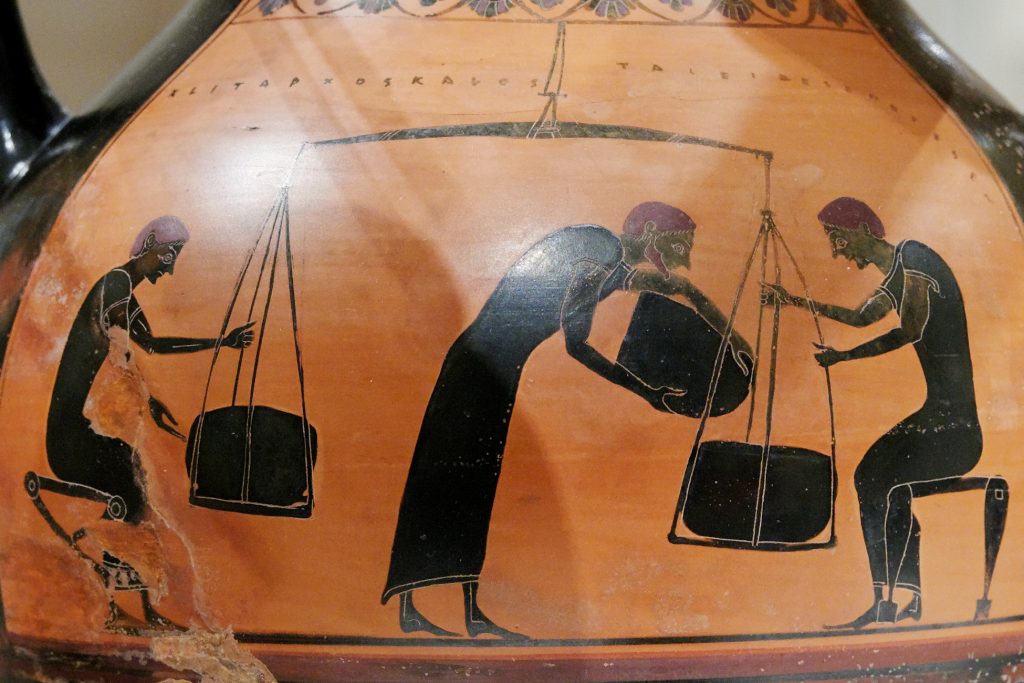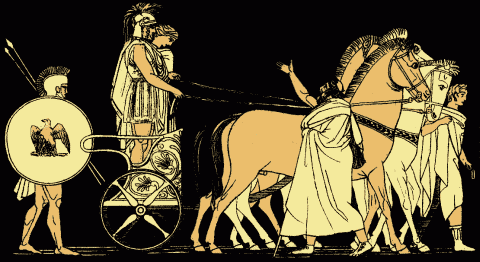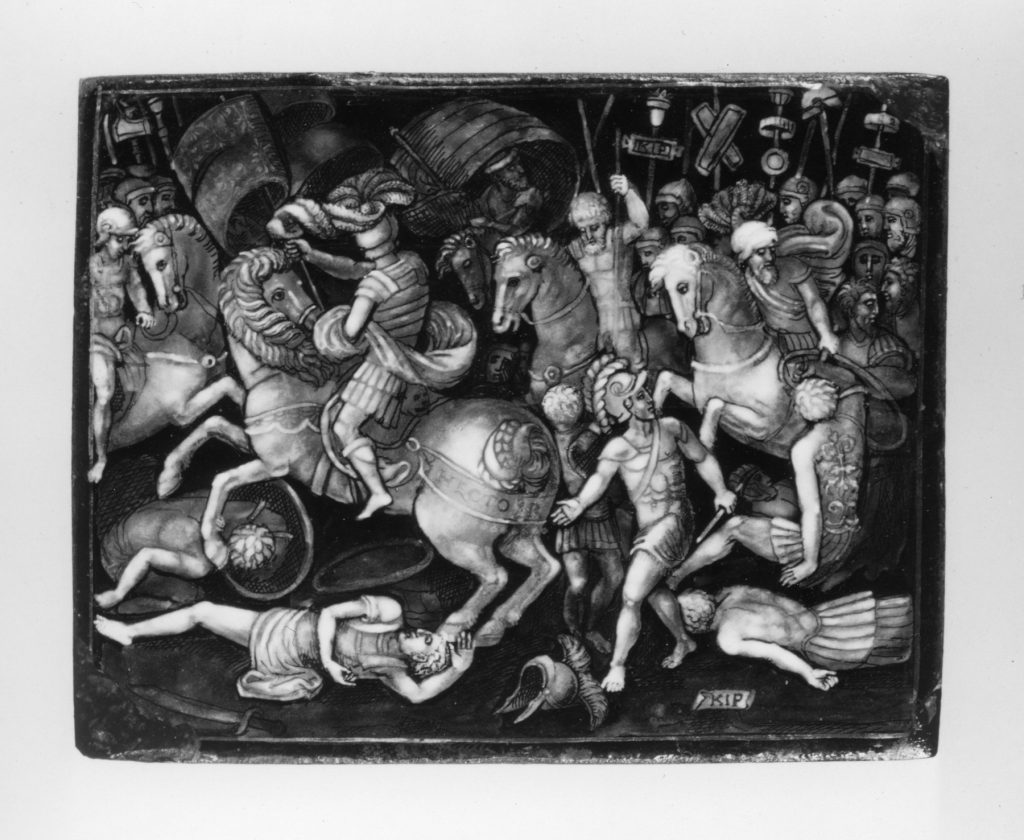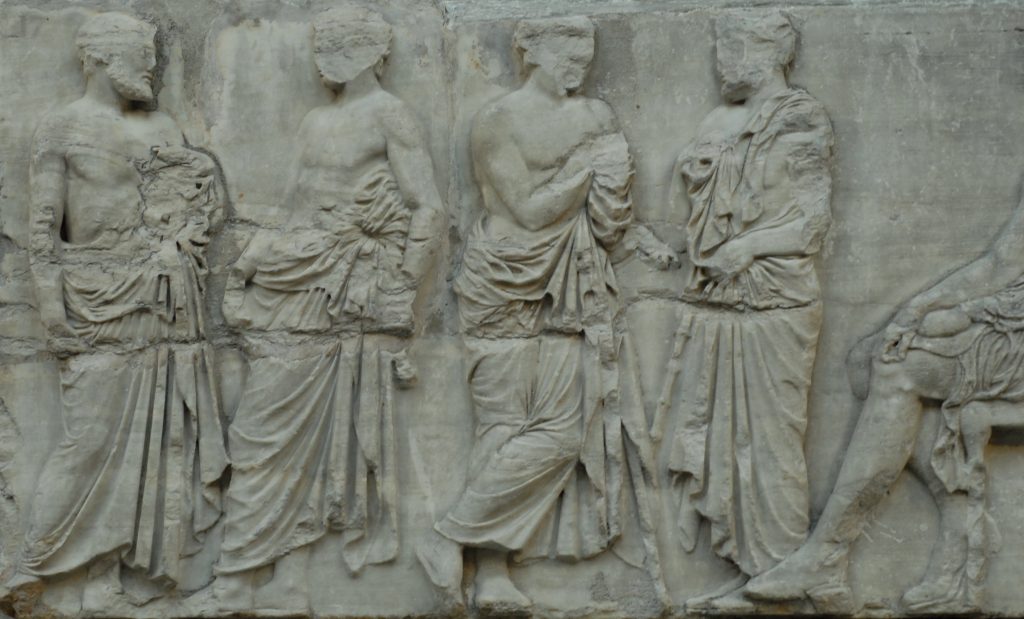This time the Core Vocab word—taken from terms in H24H
[1] and the associated Sourcebook[2]—is koros: ‘being satiated; being insatiable’. The word is not discussed in the book, so I wondered how negatively koros was presented in the texts, and whether there was any difference between genres. And what kind of satiation is referred to?
Not surprisingly, Hesiodic Works and Days has something to say about this:
The hōrā for quarreling [neikea] and agorai is a short one indeed
for anyone who does not have lasting supplies of life-sustenance
as provided by the hōrai. The Earth bears the sustenance, which is the grain of Demeter.
Feeding on this sustenance to the point of koros, you are ready to promote quarreling [neikea] and strife
over the property of others. Well, you will not be getting a second chance
35 to do what you are now doing. But come, let us now sort out [dia- krinesthai] for ourselves the quarrel [neikos],
36 with straight judgments [dikai], which are the best when they come from Zeus.Works and Days 30–36, Sourcebook
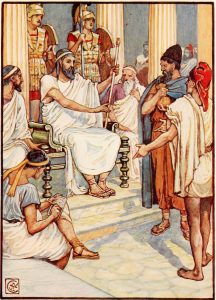 Solon is described in H24H as a lawgiver-hero active in the early sixth century BCE[3]. Here Solon expresses a similar view to that given in the Hesiodic Works and Days:
Solon is described in H24H as a lawgiver-hero active in the early sixth century BCE[3]. Here Solon expresses a similar view to that given in the Hesiodic Works and Days:
But the noos of the leaders of the community [dēmos] is without dikē.
What awaits them is the suffering of many pains because of a great hubris.
For they do not understand how to check insatiability [koros], nor can they make
kosmos for their existing merriment in the serenity [hēsukhiā] of the banquet.
They are wealthy, swayed by deeds without dīkē,
and not caring at all about sacred or public property,
they steal from one another by forcible seizure,
and they do not heed the holy institutions of dikē,
who silently observes the present and the past,
and who will in the future come to exact complete retribution.Solon F. 4.7–16, (appendix to Theognis), Sourcebook
The term is used a number of times by Pindar. For example:
….ἀλλ᾽ αἶνον ἔβα κόρος
οὐ δίκᾳ συναντόμενος, ἀλλὰ μάργων ὑπ᾽ ἀνδρῶν,
τὸ λαλαγῆσαι ἐθέλων κρύφον τε θέμεν ἐσλῶν καλοῖς
ἔργοις: …But praise is confronted by greed [koros], which is not accompanied by justice [dikē], but stirred up by depraved men, eager to babble and to bury the fine deeds of noble [esthloi] men.
Olympian 2.95–98, adapted from translation by Diane Anrson Svarlien[4]
In the Agamemnon of Aeschylus, the chorus says in part of its response to the news that the army is returning from Troy and the war—apparently, at this stage, talking about the causes of the war and the defeat for the Trojans, although, perhaps, also commenting on Agamemnon or the house of Atreus and what is to happen in the drama:
375 The penalty for reckless crime is ruin when men breathe a spirit of arrogance above just measure, because their mansions teem with more abundance than is good for them. But let there be such wealth as brings no distress, enough to satisfy 380 a sensible man. For riches do not protect the man who in his insatiability [koros] has kicked the mighty altar of Dikē into obscurity.
Aeschylus Agamemnon 375–384, Sourcebook
Although the term is not frequent in Homeric epic, in this speech, when Menelaos vaunts over Peisandros, the term koros is further emphasized by incorporating also the related verb, and its opposite when he, too, is referring to the Trojans:
O father Zeus, you, whom they say are above all both gods and men in wisdom, and from whom all things that befall us do proceed, how can you thus favor the Trojans—men so proud and overweening [men of hubris], that they are never [635] tired [korennumi = verb from koros] of fighting? All things pall [koros] after a while—sleep, love, sweet song, and stately dance—still these are things of which a man would surely have his fill rather than of battle, whereas it is of battle that the Trojans are insatiate [a-korētos].
Iliad 13.631–639, adapted from Sourcebook
Herodotus reports an oracle using the term:
χρησμοῖσι δὲ οὐκ ἔχω ἀντιλέγειν ὡς οὐκ εἰσὶ ἀληθέες, οὐ βουλόμενος ἐναργέως λέγοντας πειρᾶσθαι καταβάλλειν, ἐς τοιάδε πρήγματα1 ἐσβλέψας.
“ἀλλ᾽ ὅταν Ἀρτέμιδος χρυσαόρου ἱερὸν ἀκτήν
νηυσὶ γεφυρώσωσι καὶ εἰναλίην Κυνόσουραν
ἐλπίδι μαινομένῃ, λιπαρὰς πέρσαντες Ἀθήνας,
δῖα δίκη σβέσσει κρατερὸν κόρον, ὕβριος υἱόν,
δεινὸν μαιμώοντα, δοκεῦντ᾽ ἀνὰ πάντα πίεσθαι.
χαλκὸς γὰρ χαλκῷ συμμίξεται, αἵματι δ᾽ Ἄρης
πόντον φοινίξει. τότ᾽ ἐλεύθερον Ἑλλάδος ἦμαρ
εὐρύοπα Κρονίδης ἐπάγει καὶ πότνια Νίκη.”I cannot say against oracles that they are not true, and I do not wish to try to discredit them when they speak plainly. Look at the following matter:
“When the sacred [hieros] headland of golden-sworded Artemis and Cynosura by the sea they bridge with ships,
After sacking shiny Athens in mad [= being like a maenad] hope,
Divine Justice [dikē] will extinguish mighty Greed [koros] the son of Insolence [Hubris]
Lusting terribly [deinon], thinking to devour all.
Bronze will come together with bronze, and Ares
Will redden the sea [pontos] with blood. To Hellas the day of freedom
Far-seeing Zeus and august Victory will bring.”Herodotus Histories 8.77, adapted from translation of A.D. Godley[5]
Turning to the philosophers, In Plato we find:
ἥλικα γὰρ δὴ καὶ ὁ παλαιὸς λόγος τέρπειν τὸν ἥλικα—ἡ γὰρ οἶμαι χρόνου ἰσότης ἐπ᾽ ἴσας ἡδονὰς ἄγουσα δι᾽ ὁμοιότητα φιλίαν παρέχεται—ἀλλ᾽ ὅμως κόρον γε καὶ ἡ τούτων συνουσία ἔχει. καὶ μὴν τό γε ἀναγκαῖον αὖ βαρὺ παντὶ περὶ πᾶν λέγεται: ὃ δὴ πρὸς τῇ ἀνομοιότητι μάλιστα ἐραστὴς πρὸς παιδικὰ ἔχει.
The old proverb says, “birds of a feather flock together”; that is, I suppose, equality of age leads them to similar pleasures and through similarity begets friendship; and yet even they grow tired [koros] of each other’s society. Now compulsion of every kind is said to be oppressive to every one, and the lover not only is unlike his beloved, but he exercises the strongest compulsion.
Plato Phaedrus 240c, adapted from translation by Harold N. Fowler[6]
What seems striking in many of these selections is that koros is contrasted with dikē, at least indirectly, or associated with hubris or excess. I wonder, then, if koros is an aspect of hubris (which was the subject of an earlier post, here). What do you think?
Although these passages are taken from different genres, they often seem to express some sort of ‘gnomic truth’. Are there passages where the term is used differently?
In what other contexts does the word appear? Can being sated indicate something more benign, of simply being satisfied, or does it have overtones of excess elsewhere? And in what kinds of situations do the texts refer to someone or something as koros?
I hope members will share passages and readings in the forum to further explore how this term was used and understood.
Related terms
korennumi “satiate, fill; mid. ‘satisfy oneself; have enough of, be tired of, have one’s fill”
a-korētos “insatiated, unsated”
References
[1] Nagy, Gregory. 2013. The Ancient Greek Hero in 24 Hours. Cambridge, MA: Harvard University Press, 2013. (H24H)
[2] Sourcebook: The Ancient Greek Hero in 24 Hours Sourcebook of Original Greek Texts Translated into English, Gregory Nagy, General Editor.
[3] H24H Hour 13
[4] Pindar. Odes. Diane Arnson Svarlien. 1990. on Perseus:
Online at Perseus
[5] Herodotus, with an English translation by A. D. Godley. 1920. Cambridge. Harvard University Press. Online at Perseus
[6] Plato. Plato in Twelve Volumes, Vol. 9 translated by Harold N. Fowler. 1925. Cambridge, MA, Harvard University Press; London, William Heinemann Ltd.
Online at Perseus
Image credits
Marie-Lan Nguyen (photo) Taleides painter Men weighing merchandise, Side B of an Attic black-figure amphora, c 540–530 BCE, Metropolitan Museum of Art. Creative Commons CC BY 2.5 via Wikimedia Commons
Walter Crane: Solon, the wise lawgiver of Athens, illustration from The Story of Greece, Told to Boys and Girls, by Mary McGregor, public domain, via Wikimedia Commons
Return of Agamemnon, Project Gutenberg via Wikimedia Commons
Master KIP (thought to be Jean Poillevé), Plaque with Cavalry Battle between Greeks and Trojans, c 1550, Walters Art Museum, Creative Commons CC 0
Note: Images have been selected from pictures that are freely available with open source or Creative Commons licenses or from photographs sent in by community members for the purpose. The images in this post are intended to suggest the subject, rather than illustrate exactly—as such, they may be from other periods, subjects, or cultures. Attributions are based where possible by those shown by museums, or on Wikimedia Commons, at the time of publication on this website.
______
Sarah Scott has a degree in Language from the University of York where she specialized in philology, and has worked as an editor, technical author, and documentation manager. She is the Executive Producer for the HeroesX project, and one of the Executive Editors of the HeroesX Sourcebook. She is an active participant and member of the editorial team in Kosmos Society, with a particular interest in content development, document management, word studies, language learning, comparative linguistics, and digital humanities.
